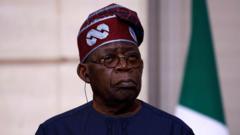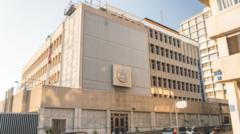The approach taken by the Trump administration could strain U.S.-Brazil relations amid growing tensions over online censorship policies.
Trump Administration’s Visa Restrictions Target Brazilian Censorship Controversy

Trump Administration’s Visa Restrictions Target Brazilian Censorship Controversy
A new U.S. policy seeks to challenge censorship by foreign officials, specifically targeting a Brazilian Supreme Court justice.
In a significant move, the Trump administration has announced plans to impose visa restrictions on foreign officials who engage in censorship activities, with Brazilian Supreme Court Justice Alexandre de Moraes seemingly being a primary target. Moraes has garnered attention in Brazil for his proactive stance against what he perceives as threats to the country's democratic framework. His tenure has seen the removal of numerous social media accounts, predominantly those affiliated with right-wing politics, stirring both fervent support and opposition.
Supporters on the left regard Moraes as a crucial defender of democracy, particularly following his actions to thwart a coup attempt in 2022. Conversely, his critics, mainly from the right, label him as a government censor, accusing him of overstepping his authority. This dichotomy has made him a polarizing figure, under siege from various fronts – including legal actions from private entities and personal threats.
Secretary of State Marco Rubio's announcement on Wednesday highlighted the administration's heightened scrutiny on censorship across the Americas, singling out Latin America as a region of concern. The restrictions raise questions of diplomatic relations, as Brazil is one of the U.S.'s most significant partners in the Western Hemisphere. The implications of these actions potentially could create friction between Brasília and Washington, especially as both nations navigate the complexities of freedom of expression and governmental oversight of digital platforms.
As the policy unfolds, it remains to be seen how Brazilian authorities will respond, and whether this move will set a precedent for U.S. engagement with countries that face similar issues regarding online expression and censorship.
Supporters on the left regard Moraes as a crucial defender of democracy, particularly following his actions to thwart a coup attempt in 2022. Conversely, his critics, mainly from the right, label him as a government censor, accusing him of overstepping his authority. This dichotomy has made him a polarizing figure, under siege from various fronts – including legal actions from private entities and personal threats.
Secretary of State Marco Rubio's announcement on Wednesday highlighted the administration's heightened scrutiny on censorship across the Americas, singling out Latin America as a region of concern. The restrictions raise questions of diplomatic relations, as Brazil is one of the U.S.'s most significant partners in the Western Hemisphere. The implications of these actions potentially could create friction between Brasília and Washington, especially as both nations navigate the complexities of freedom of expression and governmental oversight of digital platforms.
As the policy unfolds, it remains to be seen how Brazilian authorities will respond, and whether this move will set a precedent for U.S. engagement with countries that face similar issues regarding online expression and censorship.





















